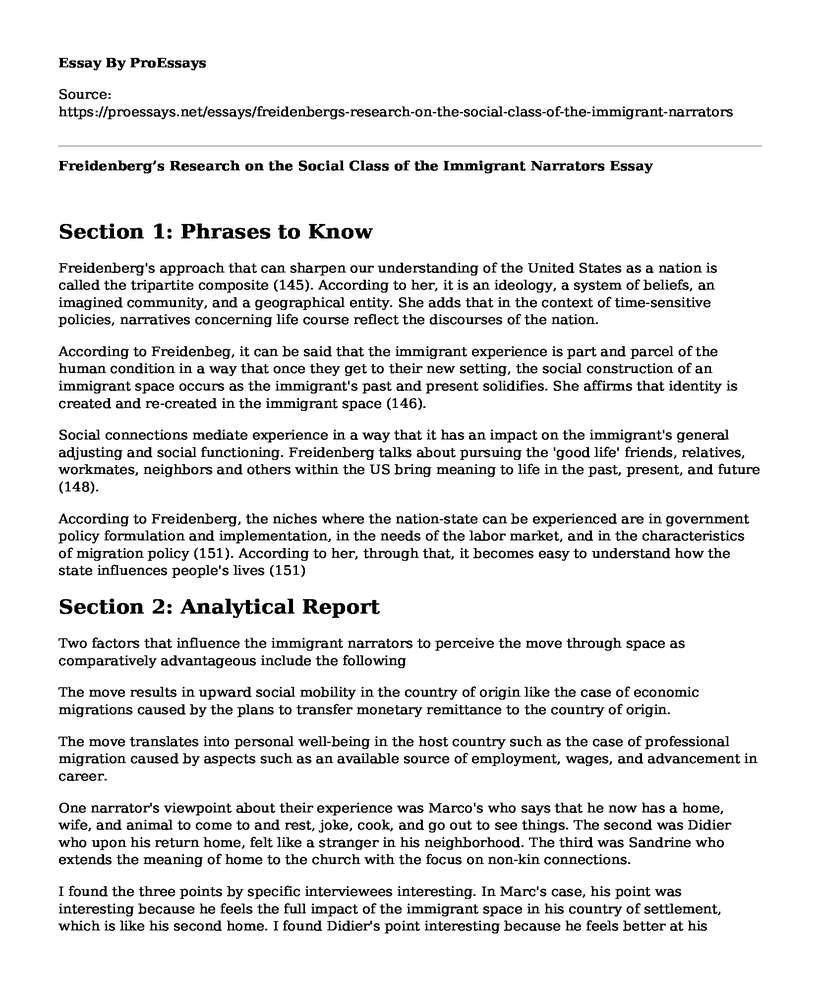Section 1: Phrases to Know
Freidenberg's approach that can sharpen our understanding of the United States as a nation is called the tripartite composite (145). According to her, it is an ideology, a system of beliefs, an imagined community, and a geographical entity. She adds that in the context of time-sensitive policies, narratives concerning life course reflect the discourses of the nation.
According to Freidenbeg, it can be said that the immigrant experience is part and parcel of the human condition in a way that once they get to their new setting, the social construction of an immigrant space occurs as the immigrant's past and present solidifies. She affirms that identity is created and re-created in the immigrant space (146).
Social connections mediate experience in a way that it has an impact on the immigrant's general adjusting and social functioning. Freidenberg talks about pursuing the 'good life' friends, relatives, workmates, neighbors and others within the US bring meaning to life in the past, present, and future (148).
According to Freidenberg, the niches where the nation-state can be experienced are in government policy formulation and implementation, in the needs of the labor market, and in the characteristics of migration policy (151). According to her, through that, it becomes easy to understand how the state influences people's lives (151)
Section 2: Analytical Report
Two factors that influence the immigrant narrators to perceive the move through space as comparatively advantageous include the following
The move results in upward social mobility in the country of origin like the case of economic migrations caused by the plans to transfer monetary remittance to the country of origin.
The move translates into personal well-being in the host country such as the case of professional migration caused by aspects such as an available source of employment, wages, and advancement in career.
One narrator's viewpoint about their experience was Marco's who says that he now has a home, wife, and animal to come to and rest, joke, cook, and go out to see things. The second was Didier who upon his return home, felt like a stranger in his neighborhood. The third was Sandrine who extends the meaning of home to the church with the focus on non-kin connections.
I found the three points by specific interviewees interesting. In Marc's case, his point was interesting because he feels the full impact of the immigrant space in his country of settlement, which is like his second home. I found Didier's point interesting because he feels better at his country of origin even though no one managed to recognize him. I found Sandrine's point interesting because she does not feel any biological bond with anyone at her country of settlement.
Freidenberg's research on the social class of the immigrant narrators focused on trans-nationalism as an aspect of globalization. According to her, it is significant to understand the narrator's experience of their formations of the state and the nation. Also, she adds that an immigrant's decision is always based on the personal, social, economic, and political area of influence.
Freidenberg's conclusion of her comparison of the social class of the immigrants she interviewed with social class mobility in the United States, generally, is that people understand social mobility based on their experiences and social standings.
One of the interviewees called Ortner affirmed that he lives according to his means because a rich lifestyle is a methodological problem. Another point he mentions is that he has strong connections with his country of origin. I found his points interesting because they provide in-depth information on the way structures of difference are perceived. Besides, Bourdieu indicates that a simple lifestyle, just as he learned in his country of origin brings fewer problems. I found his point interesting because he provided information on life from another perspective.
Works Cited
Freidenberg, Judith, Noemi. Contemporary Conversations on Immigration in the United States:
The View from Prince George's County Maryland. Lanham, MD: Lexington Books. 2016. Print.
Cite this page
Freidenberg's Research on the Social Class of the Immigrant Narrators. (2022, Oct 25). Retrieved from https://proessays.net/essays/freidenbergs-research-on-the-social-class-of-the-immigrant-narrators
If you are the original author of this essay and no longer wish to have it published on the ProEssays website, please click below to request its removal:
- Fetal Alcohol Abuse Syndrome
- Manifestations of Whiteness Through A Presidential Statement
- Essay Sample on Sexual Discrimination Lawsuit
- Research Paper on Illegal Immigration in America: 3.3% of Population and Rising
- US Agencies vs Terror: Challenges & Solutions - Essay Sample
- Essay Example on EU Migrant Crisis: A Search for Hope and a Better Future
- Essay Example on Women's Fight for Equality: A Glimpse into History's Harsh Reality







